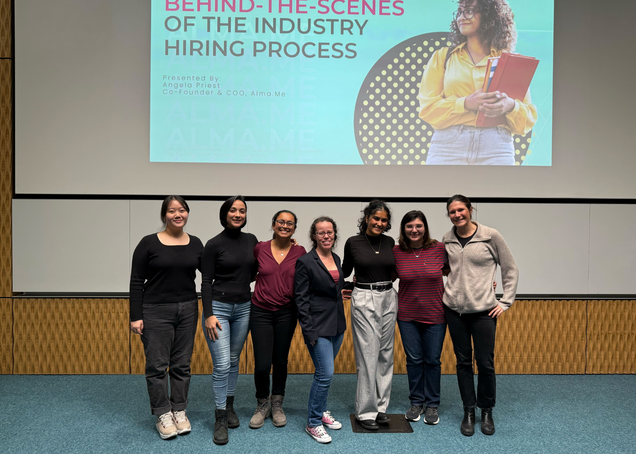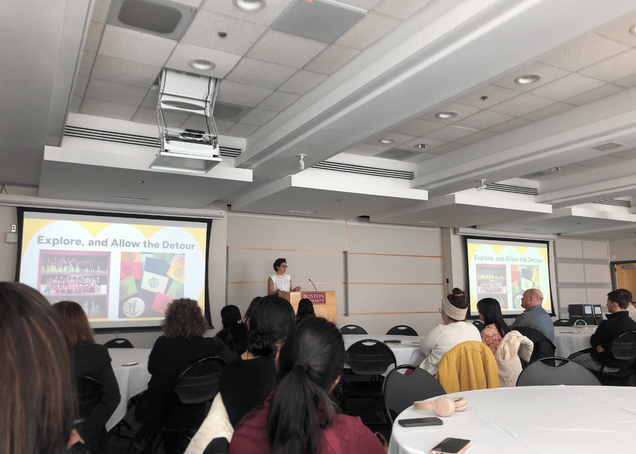GWISE Creates Community to Support Women in Science and Engineering Fields
Graduate Women in Science and Engineering at Boston University builds its community through three pillars: social, mentorship and outreach, and professional development.
With these pillars standing strong, the group’s goal is to empower women in the fields of science, engineering, math, and technology.
GWISE first launched 15 years ago. It prides itself on professional development seminars, mentoring, social opportunities, and networking events.
“GWISE has taught me to understand there’s many things that can help you grow as a person, versus just learning about the science,” said GWISE President Pooja Chainani, a fourth-year PhD candidate in mechanical engineering. “You need to learn how to be a leader, how to communicate, how to network … So that’s helped me a lot in trying to explore different areas I can grow as an individual.”

Chainani said she has seen GWISE grow a lot in the past few years. She has seen the group’s relationship with the university administration flourish as well. GWISE has advanced university policies like sick leave, Chainani said.
“I feel like event attendance has increased, and interest in joining the organization and being involved in many different events has also grown,” said Outreach Co-Chair Sarah Loshinsky, a third-year PhD candidate in biomedical engineering.
GWISE also offers a multitude of resources for students. Some graduates have been changing direction, Chainani said, and they are often looking for career events to help make decisions.
“PhDs have historically been geared toward setting students up for academic careers,” said GWISE Vice President Avery Kratzer, a third-year PhD candidate in rehabilitation sciences. “I think a lot more students now are interested in industry careers, so we’ve definitely been trying to cater to that.”
The officers truly support the students, pulling together more than 20 events during this past fall semester.
Recruiting keynote speakers
GWISE also hosts an Annual Fall and Spring Luncheon. Fall focuses on mentorship, while spring promotes advocacy. Though, over the years, the group has not limited the speakers to just those two topics, Chainani said. The officers expect to host their spring keynote in late March.
“We give [speakers] the freedom to shape [the talk] the way they want,” she added. “Not having that script is actually really insightful for us to listen to, because we’ve been able to learn about being a parent and having a career.”
In the keynote this past fall, one speaker opened up about her life, saying, “Your career is a ladder,” Chainani recalled.

The speaker, Andreina Parisi-Amon, has over 15 years of experience researching education and curriculum development. Parisi-Amon spoke on recently having two children, adjusting her career, and merging personal and work life the best way she can.
“I really like the way our … keynote speakers merge this idea of work-life balance, and how you can pursue all of your career goals, while also keeping in mind all the other things that come with just being an adult,” Loshinsky said. “A lot of the insight that we’ve gotten from those speakers has been really useful to me, and thought-provoking.”
As women in the science and engineering field, Chainani, Loshinsky, and Kratzer said they often resonate with these talks because they are “reassuring” and “affirming.”
“A lot of points that [speakers] make are unique to being a woman,” Kratzer said. “I think the keynotes are always a good time to sit down and hear a really accomplished woman talk about these things that aren’t talked about.”
Collaborating with allies
GWISE also works with WISEGuys, a group of male allies who advocate for women in STEM. They aim to recruit male graduate students through events and resources.
GWISE has two WISEGuys representatives on its board.
“They attend our monthly meetings, and they’ve been really great,” Kratzer said. “Over the years, I’ve learned how important it is to have male allies, because as a woman in science, you are just statistically underrepresented, so you need males that are advocating for you.”
On top of graduate assistance, GWISE also works with UWISE, Undergraduate Women in Science and Engineering. GWISE offers a mentorship program where grads and undergrads meet once a month.
There’s a curriculum undergraduates can choose to follow, including talking points and tips, Loshinsky said. Undergrads can hear what it is like to be a grad student, and they can explore what kind of careers are thriving.

“Those [talks] tend to be pretty well-received,” Loshinsky said. “I even know some undergrads that began research in labs because of somebody they met through this mentorship program, which is really nice to see.”
Mentoring and Outreach
GWISE hosts another mentoring and outreach opportunity, the Elementary School Girls Science Club, GSC. Volunteers assist in running hands-on activities for elementary school girls. GSC aims to help these girls gain a better understanding of science, encouraging them to pursue careers in STEM fields.
“It’s so worthwhile to have mentors that look like you, and [being around] people who look like you,” said Katie Breuckman, a GSC volunteer and a second-year PhD candidate in molecular biology, cell biology, and biochemistry. “Encouraging young girls to get involved in science and math and engineering is really rewarding.”
When Loshinsky thinks about mentorship, she said she looks for people in her lab, speakers GWISE brings in, and people she interacts with on the board.
Kratzer expressed a similar sentiment.

“We just have such a good team of people,” she said. “It’s really inspired me to keep moving forward in science and to draw qualities from the people around me.”
For Chainani, GWISE’s themes of mentorship and outreach are centered on younger students in the community. Social and professional development are common goals she sees from her peers. Chainani also sees the older generation, often featured as speakers at GWISE events, connecting with younger students.
“We’re able to learn from three different generations of scientists: What kind of mentors we want to be for the younger generation, how we want to interact with our peers, and what we can learn from the older generation,” Chainani said. “So I think those are really valuable lessons.”
By fostering connections across generations, disciplines, and various on-campus groups, GWISE fulfills its mission to empower women in STEM to thrive, inspire, and lead in challenging and evolving fields.